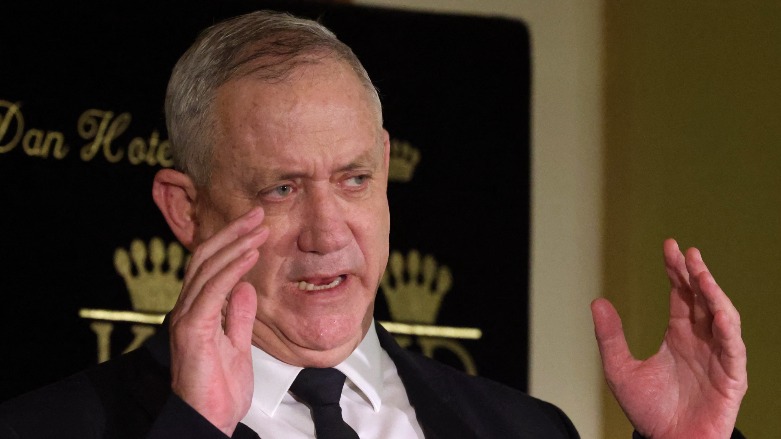Israeli Defense Minister to meet senior US officials

WASHINGTON DC (Kurdistan 24) – Pentagon Press Secretary John Kirby announced on Tuesday that Israel's Secretary of Defense, Benny Gantz, will visit Washington to meet with the US Secretary of Defense Lloyd Austin on Thursday.
It was also announced that Gantz would meet separately with US National Security Adviser, Jake Sullivan.
Thursday's meeting will be the second between Austin and Gantz in less than two months. Austin visited Israel in April, when his discussions focused on the talks with Iran, which had just begun, on reviving the 2015 nuclear deal, formally known as the Joint Comprehensive Plan of Action (JCPOA)—which is a key goal of the Biden administration.
Read More: Iran nuclear talks in Vienna begin smoothly
In addition to discussing Iran, Gantz will also ask for support in restocking Iron Dome—Israel's air defense system, which is depleted after protecting the country, while Hamas rained over 4,000 missiles on Israeli cities in the 11-day war last month.
State of Iran's Nuclear Program
Just before Austin's April 11 arrival in Israel, following the first week of indirect talks on reviving the JCPOA, there was an explosion at Iran's Natanz uranium enrichment facility. Tehran denounced the blast as “nuclear terrorism” and blamed Israel.
The impact of the Natanz explosion was revealed in a report released on Monday by the International Atomic Energy Agency (IAEA): Iran's production of enriched uranium fell by nearly 50%, dropping to 273 kilograms in the three months ending on May 22. That is a little more than half the 525 kg that Iran produced in the previous quarter, as The Wall Street Journal reported.
Following the sabotage at Natanz, Iran announced it would increase its enrichment of uranium to 60%. The JCPOA limits Iran's enrichment to 3.67% and its stockpile of enriched uranium of 300 kg.
In January, Iran began to raise its uranium enrichment to 20%, and 60% represents a further, alarming step.
Indeed, the head of the IAEA, Rafael Grossi, speaking with the Financial Times last week, described Iran's current level of uranium enrichment as “very concerning.”
“A country enriching uranium at 60 percent is a very serious thing—only countries making bombs are reaching this level,” Grossi stated. “Sixty per cent is almost weapons grade, commercial enrichment is 2, 3 [per cent.]
Moreover, Monday's IAEA report estimated Iran's stockpile of enriched uranium at 3,241 kg, some 16 times higher than allowed in the JCPOA. If purified to weapons-grade level, the Journal said, it would likely be enough for up to three nuclear bombs.
Of that stockpile, however, only 2.4 kg is 60% enriched uranium. Iran's stockpile of 20% enriched uranium is 63 kg, with the rest being low-enriched uranium.
Israel's Persistent Concern about Iran's Nuclear Program
On Tuesday, before Kirby announced Thursday's meeting between Austin and Gantz, Israeli Prime Minister Benjamin Netanyahu warned that a nuclear-armed Iran was an “existential threat to Israel.”
Like US critics of the JCPOA, Netanyahu does not believe that restoring the agreement will prevent Iran from acquiring nuclear weapons.
Indeed, Netanyahu stated, “If we have to choose—I hope it doesn't happen—between friction with our great friend the United States and eliminating the existential threat—eliminating the existential threat will prevail.”
Gantz, however, criticized Netanyahu describing the Biden administration as a “true friend,” adding, “even if there are disagreements, they must be solved behind closed doors and not with defiant rhetoric that could harm Israel's security.”
Although Netanyahu's tenure as Israeli prime minister is likely coming to an end, his view is widely shared among Israel's leadership.
Asked on Tuesday, if Iran would be discussed in Austin's meeting with Gantz, Kirby replied, “Among the things they will talk about are regional security issues, and clearly, we have every expectation that Iran and their malign behavior in the region will certainly come up,” he said.
The Israeli press, citing Sen. Lindsey Graham (R, South Carolina), who is visiting Israel and met with Gantz on Tuesday, explained that the most pressing issue for the Israeli Defense Minister will be to secure $1 billion in emergency aid to resupply materiel consumed in the war with Hamas.
Graham was confident the request would be approved, although Democrats, particularly self-styled “progressives,” were critical of Israel's bombing of Gaza, and they control both houses of Congress, as well as the White House.
“There's been a big dustup over the last engagement between Hamas and the State of Israel in the United States, but I'm here to tell you that there's a wide and deep support for Israel among the Democratic Party,” Graham told journalists at a press conference in Jerusalem.
